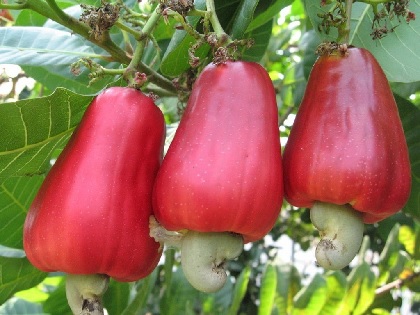
The agricultural sector continues to be a significant contributor to Ghana’s export earnings and a major source of input for the manufacturing sector. Agriculture is the most important sector for building livelihoods in rural areas. It is also the main engine for growth and it has the potential to create more jobs through value additions for the unemployed youth. However, the Ghanaian agriculture sector continues to be dominated by primary production, with limited agro processing and value addition capacities which are well known setbacks (World Bank report 2019).
Currently RUDEYA is promoting cashew value additions for over 1000 small holder farmers across the transitional and the northern eco savanna zones in Ghana. The project aims to strengthen the capacity of small holder farmers on different levels.
First of all, the project promotes the integration of beekeeping in the cashew plantations to improve incomes, livelihoods and also higher yields through pollination and inter environmental dependence for cashew plants and the bees.
Secondly, by providing skills and technical training in both cashew farming and beekeeping. The project provides comprehensive training for the integration of the two agricultural commodities and from production, through processing and marketing for cashew and honey products to achieve higher incomes for the small holder farmers. The project provides training and capacity development for the development and utilization of full potentials from the cashew apple, nut, honey, wax and other by products.
Thirdly, to develop systems to resource the small holder families to take advantage in primary processing and to link them to secondary processors and finally to develop effective marketing strategies for equitable and fair trade for the small holder farmers.
CSO and Community Independent Forest monitoring (IFM)
Ghana’s rainforest is rapidly disappearing. In 2018 alone, the country saw an alarming 60% decrease in primary (pristine) forest (Rainforest Trust). This was the highest percentage of rainforest loss of any tropical country. Currently Ghana has one of the highest deforestation rates (2% FAO) aside from Nigeria and Togo in the tropical world. One of the major causes of deforestation is illegal logging. To help control illegalities in the timber sector Ghana and the EU have signed the VPA/FLEGT to control the trade and export of illegal timber to the EU and ultimately in the domestic market. One of the mechanisms of the VPA/FLEGT is the development of independent monitoring mechanisms through the Ghana LAS for effective forest law compliance.
The Ghana VPA/FLEGT enjoins the CSOs and Forest Communities to play important roles in forest monitoring. However, there are no clear policy provisions for civil society and forest communities to play their proper roles as independent monitors. RUDEYA in collaboration with the key stakeholders have developed CS/Community independent monitoring guidelines which enables CS/Community actors to carry out independent monitoring and come out with validated IFM reports to the general public and external buyers.
RUDEYA in 2017/2018 with funding from the FAO piloted and completed CS/Community IFM project that enable previously marginalized forest communities to complement official forest monitoring to improve compliance with the Ghana Legality Assurance System (LAS). CS/Community IFM seeks to improve transparency, accountability and equitable SRAs for community development and poverty reduction in forest communities. It will also provide sustainable community architecture for CS/Community IFM. RUDEYA is currently looking for partners and donors to up-scale this project to cover all the 46 forest districts in Ghana.
Child Labour and Trafficking in the fishing communities along the Volta Lake.
In recognition of the Universal Declaration Of Human Rights that “All human beings are born free and equal in dignity and rights” and according to Ghana National Plan of Action for the Elimination of the Worst Forms of Child Labor (NPA2 (2017-21). RUDEYA in partnership with the Sustainable Net Partners is pursuing close and effective Networking and Collaboration with the law enforcement agencies, educational and religious institutions, community watchdogs and human rights defenders to promote specific actions to contribute to the elimination of worst forms of child labor and trafficking along the Volta Lake fishing communities.
In connection with this project RUDEYA is seeking partnerships for the promotion of alternative livelihoods and sustainable self-employment opportunities for women and youth to create economic growth in the fishing communities along the Volta Lake.